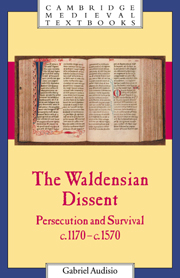Book contents
- Frontmatter
- Contents
- List of maps
- Preface
- Acknowledgements
- Introduction
- 1 1170 – 1215: decisive and purposive origins
- 2 The thirteenth century: the need to adapt
- 3 The fourteenth century: the challenge of believing differently
- 4 The fifteenth century: the risks of longevity
- 5 The constraints of a life in hiding
- 6 The need to organise
- 7 A culture of their own: the written and the spoken word
- 8 The sixteenth century: the end as a way forward?
- 9 Epilogue: the Waldensian Church
- Conclusion
- Bibilography
- Index
- Cambridge Medieval Textbooks
Introduction
Published online by Cambridge University Press: 05 June 2012
- Frontmatter
- Contents
- List of maps
- Preface
- Acknowledgements
- Introduction
- 1 1170 – 1215: decisive and purposive origins
- 2 The thirteenth century: the need to adapt
- 3 The fourteenth century: the challenge of believing differently
- 4 The fifteenth century: the risks of longevity
- 5 The constraints of a life in hiding
- 6 The need to organise
- 7 A culture of their own: the written and the spoken word
- 8 The sixteenth century: the end as a way forward?
- 9 Epilogue: the Waldensian Church
- Conclusion
- Bibilography
- Index
- Cambridge Medieval Textbooks
Summary
‘Another history of the Waldensians!’, certain readers, specialists in particular, might be thinking. ‘Is it called for? What is the use?’ Similar endeavours have become increasingly frequent since the sixteenth century. A minority religious dissent has intrigued those who have studied religious history in Europe to such an extent that an alarming wealth of bibliographical documentation awaits the neophyte. Acquainting oneself with it is not only a time-consuming task, it is also fastidious, for the works are repetitive and the authors have sometimes plagiarised one another shamelessly. The latest synthesis, by Giorgio Tourn, appeared in 1980, if we discount those works which have been published on the question but which cannot really be called historical studies, whatever their authors may think. Has our knowledge on the matter progressed sufficiently to justify a new update for a readership beyond the limited circle of Waldensian specialists?
There are several reasons which can plead in favour of a new version of Waldensian history. First, it must be acknowledged that important results from research carried out and published in the 1970s and even the 1960s have yet to be taken into account by the authors of recent, general histories of the Waldensians intended as broad surveys addressed to the general public For instance, although their work is well known and much appreciated, little or no reference has been made in recent general studies to Kurt-Viktor Selge, Alexander Patschovsky, Dietrich Kurze and Grado Merlo or even Amadeo Molnar and Romolo Cegna to some extent.
- Type
- Chapter
- Information
- The Waldensian DissentPersecution and Survival, c.1170–c.1570, pp. 1 - 5Publisher: Cambridge University PressPrint publication year: 1999



